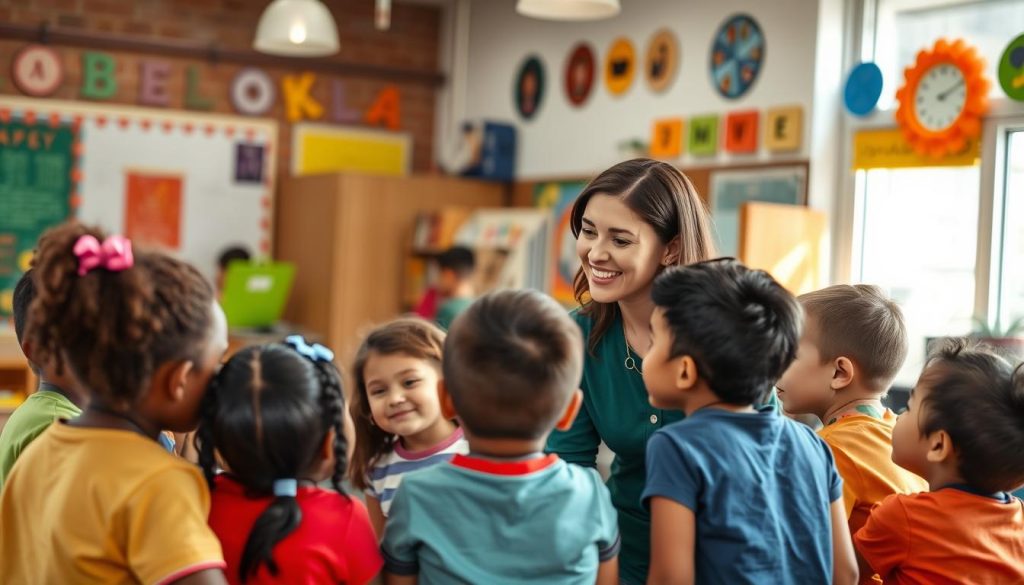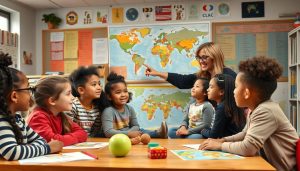Why Building Relationships with Students Matters
Research consistently shows that strong teacher-student relationships are linked to higher academic achievement, improved attendance, and fewer behavioral issues. When students feel connected to their teachers, they’re more motivated to participate and engage with learning materials.
Developing these relationships requires intentional effort and specific teacher skills that go beyond academic instruction. Teachers who excel at building connections understand that taking time to know their students as individuals pays dividends throughout the school year.
According to a study from the American Psychological Association, students who report feeling supported by their teachers experience less stress and anxiety about school. This emotional security creates an environment where students feel safe to take risks, make mistakes, and grow academically.
Enhance Your Relationship-Building Skills
Looking to strengthen your teacher skills in building meaningful connections with students? Credits for Teachers offers professional development opportunities designed specifically for K12 educators.
Essential Strategies for Building Relationships with Students
Creating strong connections doesn’t happen by accident. It requires deliberate practices and refined teacher skills. Here are proven strategies that effective educators use when building relationships with students:
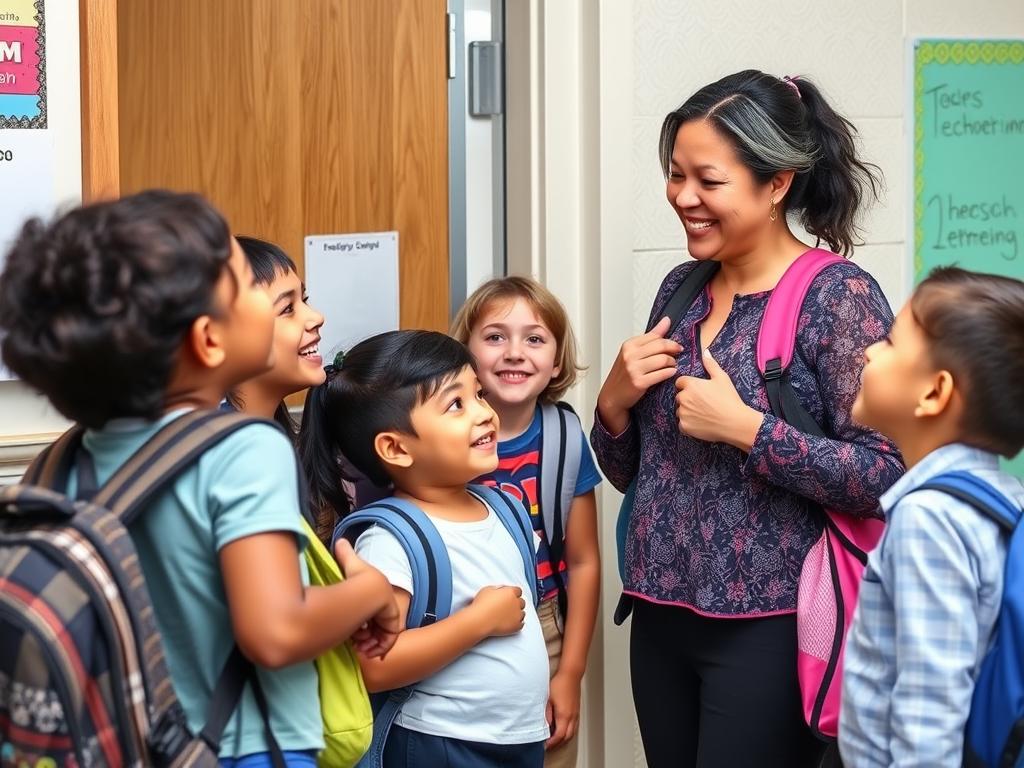
1. Greet Students Daily
Never underestimate the power of a simple “hello” and “goodbye” each day. Standing at your door to personally greet each student by name creates a welcoming atmosphere and sets a positive tone. This small investment of time shows students you notice and value them as individuals.
Try adding a brief personal comment or question that shows you remember something about them: “How was your basketball game last night?” or “I’m looking forward to hearing about that book you’re reading.” These personalized greetings are fundamental teacher skills that help students feel seen and appreciated.
2. Learn About Their Interests
Taking time to discover what excites your students outside of academics builds bridges of connection. Consider using student questionnaires at the beginning of the year to learn about their hobbies, favorite music, books, or activities.
Referencing these interests during lessons or casual conversations shows students you value them as whole people, not just as learners in your classroom. This knowledge also provides valuable hooks for making learning relevant and engaging.
3. Share Appropriately About Yourself
Building relationships with students works both ways. When you share appropriate stories about your own interests, experiences, or even challenges, you become more relatable. Students appreciate seeing their teachers as real people with lives outside the classroom.
This doesn’t mean oversharing personal details, but rather finding meaningful connections through shared interests or experiences that can strengthen your classroom community.
4. Provide Writing Opportunities
Some students may feel more comfortable expressing themselves in writing than verbally. Journal prompts like “What’s one thing you wish your teacher knew about you?” or “What are you looking forward to this week?” give students a private channel to share their thoughts and concerns.
These writing activities not only build literacy skills but also provide valuable insights into your students’ lives, helping you develop the teacher skills needed to support them effectively.
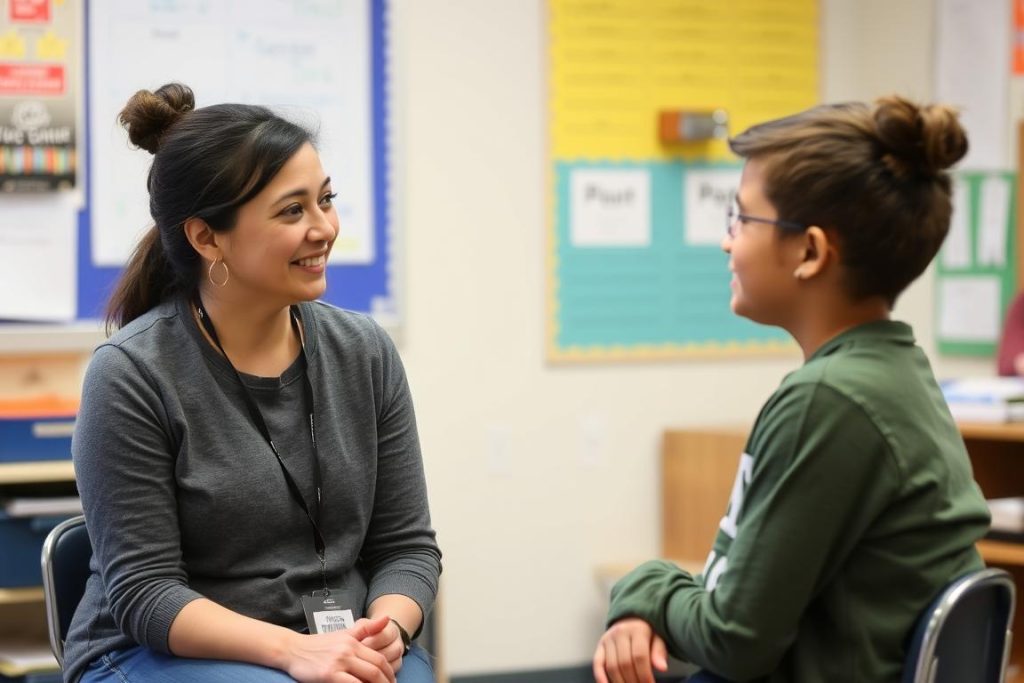
5. Practice Active Listening
When students speak, give them your full attention. Make eye contact, ask follow-up questions, and reflect back what you hear. This demonstrates that you value their thoughts and perspectives.
Active listening is one of the most important teacher skills for building trust. When students know you’ll truly hear them out, they’re more likely to approach you with questions, concerns, or ideas.
6. Recognize and Celebrate Achievements
Acknowledge both academic and personal growth. Celebrating small wins builds confidence and motivation. This might include highlighting improvement in a specific skill, recognizing acts of kindness, or praising perseverance through challenges.
The key is to be specific with your praise: “I noticed how you helped explain that concept to your classmate” is more meaningful than a generic “good job.”
Develop Your Student Connection Skills
Ready to take your relationship-building strategies to the next level? Credits for Teachers offers courses in building positive classroom environments.
Overcoming Challenges in Building Relationships with Students
Even with the best intentions, educators sometimes face obstacles when building relationships with students. Understanding these challenges and developing teacher skills to address them is essential for creating meaningful connections with all students.
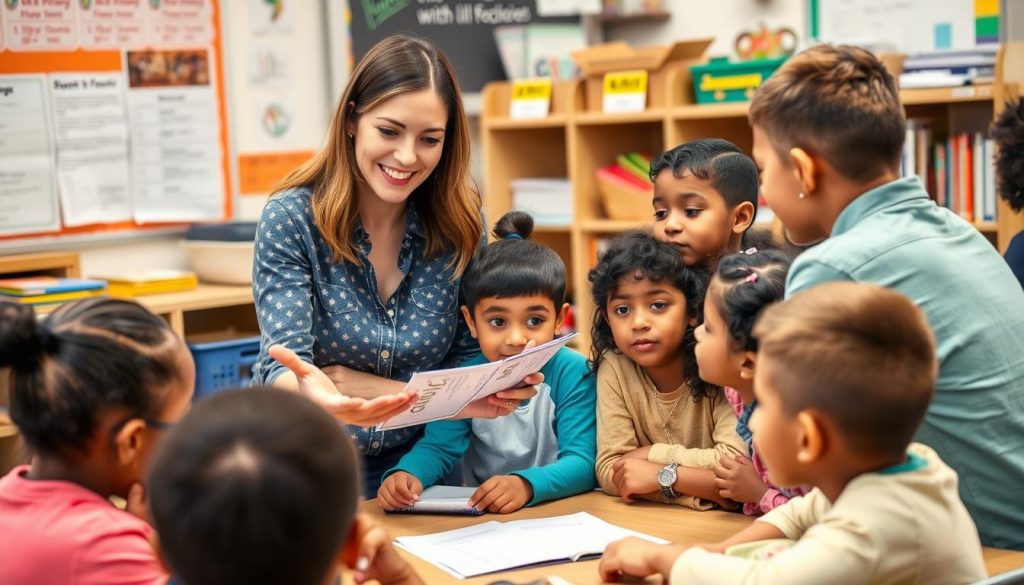
Working with Reluctant or Withdrawn Students
Some students may be hesitant to engage or connect due to past experiences, personality differences, or other factors. For these students, building relationships requires patience and persistence.
Try finding low-pressure ways to connect, such as written notes, interest-based conversations, or giving them special classroom responsibilities that play to their strengths. Remember that trust develops at different rates for different students.
Managing Time Constraints
With curriculum demands, standardized testing, and administrative responsibilities, finding time for relationship-building can be challenging. However, integrating connection opportunities into your regular routines is possible.
Use transition times, morning meetings, or brief check-ins to maintain connections. Remember that even small, consistent efforts to connect can have a significant impact over time.
Balancing Relationships and Boundaries
While building relationships with students is essential, maintaining appropriate professional boundaries is equally important. Effective teacher skills include knowing how to be approachable and supportive while maintaining your role as an educator.
Clear, consistent expectations actually strengthen relationships by creating a safe, predictable environment. Students respect teachers who can be both kind and firm when necessary.
“They don’t care how much you know until they know how much you care.”
– Theodore Roosevelt
This quote reminds us that our content knowledge and teacher skills are most effective when delivered within the context of caring relationships.
Long-Term Benefits of Building Relationships with Students
The effort invested in building relationships with students yields benefits that extend far beyond the current school year. These connections create a foundation for academic success and personal growth that can impact students for years to come.
Improved Academic Performance
Students who feel connected to their teachers are more likely to engage with learning materials, participate in class discussions, and persist through challenging tasks. This increased engagement naturally leads to improved academic outcomes.
When students know their teacher believes in them, they’re more likely to believe in themselves. This confidence is a powerful driver of academic achievement.
Enhanced Classroom Management
Strong relationships significantly reduce behavioral issues. Students are more likely to follow classroom expectations when they respect and feel respected by their teacher.
This positive dynamic creates more time for instruction and meaningful learning activities, as less time is spent addressing disruptive behaviors.
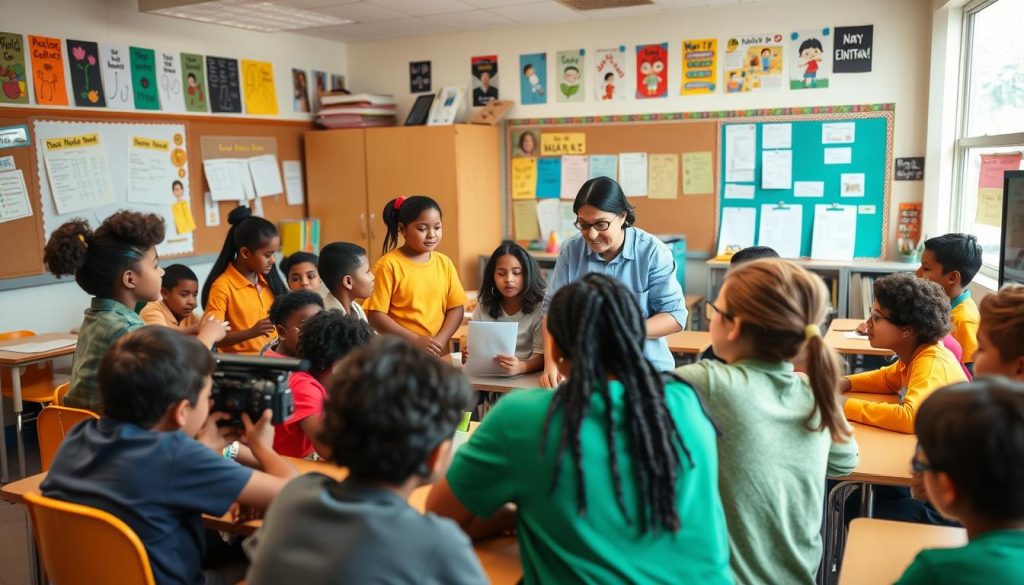
Increased Student Well-Being
Students who have positive relationships with their teachers report higher levels of happiness at school and lower levels of anxiety. These emotional benefits create a foundation for learning and growth.
The teacher skills involved in building these supportive relationships help students develop resilience and coping strategies that serve them well beyond the classroom.
Lasting Impact
The connections you build with students can have effects that last long after they leave your classroom. Many adults can name specific teachers who made them feel valued and capable, influencing their educational journey and career choices.
By investing in building relationships with students now, you’re potentially shaping their relationship with education for years to come.
Invest in Your Relationship-Building Skills
Enhance your teacher skills and make a lasting impact on your students. Credits for Teachers provides professional development that fits your busy schedule.
Conclusion: The Ongoing Journey of Building Relationships with Students
Building relationships with students is not a one-time task but an ongoing process that requires consistent effort, reflection, and refinement of your teacher skills. Each student is unique, and the connections you build will vary, but the fundamental principles of respect, genuine interest, and supportive communication remain constant.
Remember that even small, daily interactions contribute to the overall relationship. A greeting at the door, a thoughtful question about a student’s interest, or a moment of celebration for progress made—these seemingly minor touchpoints accumulate to create meaningful connections.
As you continue developing your teacher skills in building relationships with students, be patient with yourself and the process. Some connections will form quickly, while others take time to develop. What matters most is your consistent commitment to seeing, hearing, and valuing each student in your classroom.
Continue Your Professional Growth
Ready to deepen your expertise in building relationships with students? Credits for Teachers offers specialized courses designed by educators for educators.
By investing in these essential teacher skills, you’re not only enhancing your classroom environment today but potentially changing the trajectory of your students’ educational journeys for years to come. The relationships you build may be the most lasting and meaningful aspect of your teaching legacy.

